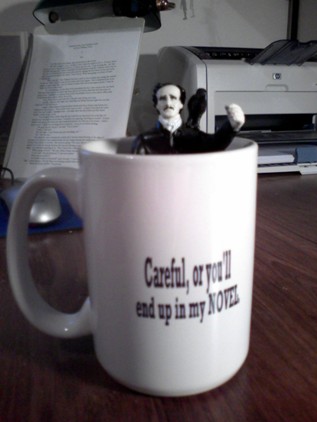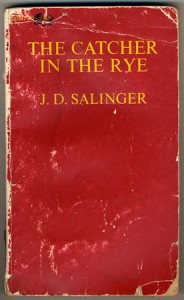 Poe: So I heard J.D. died the other day.
Poe: So I heard J.D. died the other day.
Scott: J.D.? As in Salinger?
Poe: Yes, didn’t you hear?
Scott: Oh, I heard. I’m just curious how the news got to you since I don’t have the Internet or the radio in here.
Poe: Oh, you know, when you’re a famous writer, you tend to just know when one among us has passed.
Scott: Ah. Well. You see, you’re not really a famous writer. You’re a fictional construct manifested by my imagination in the form of an action figure.
Poe: Details, details.
Scott: You know, I have been thinking about Salinger lately, though. I have to admit, when I sat down to write The Last Great Getaway of the Water Balloon Boys, there was part of me that really was trying to capture the same authenticity of voice that he did. I’ve even described the story as Catcher in the Rye meets Thelma and Louise.
Poe: So what are you saying? You want to move to New Hampshire and live as a hermit?
 Scott: There are days. But no, I’ve been thinking how there’s this rumor Salinger has a safe full of manuscripts. I mean, he hasn’t published anything in over 50 years. He told the New York Times a couple decades ago that he still writes, but just for him. I’ve been thinking about whether that’s a good or bad thing.
Scott: There are days. But no, I’ve been thinking how there’s this rumor Salinger has a safe full of manuscripts. I mean, he hasn’t published anything in over 50 years. He told the New York Times a couple decades ago that he still writes, but just for him. I’ve been thinking about whether that’s a good or bad thing.
Poe: How so? If it makes him happy, what’s the difference?
Scott: To him? None. Catcher made him extraordinarily rich, so he didn’t need to write for money any more. But there’s something about writing for an audience, for readers, that I think demands a certain amount of engagement with the world. Writing is communication, after all. If you’re not communicating with anyone other than yourself, are you still communicating?
Poe: Ah, but that’s not to say my friend J.D. wasn’t writing for readers. He just didn’t feel rushed to share those later works with readers. There’s a big difference between publication and writing. Once it’s written, what’s the difference whether it’s read or not? It doesn’t change what it is. Take the Diary of Anne Frank. An extraordinary work, and yet there’s no indication she was writing for anyone other than herself.
Scott: Well, that’s what I’m driving at. That’s one book, not a career. Sadly, we’ll never know what Frank would have written after that. If I want to become the best storyteller I can be, how can I do that without some kind of feedback? I’m not talking about critics, per se. I’m talking about audience. If you make a movie, how do you know if that movie entertains unless you screen it? But there’s the other side of me that says you’re much more likely to stay true to your own unique vision, your own voice, the less you let others influence you — at least directly. Influences are all around us.
Poe: Perhaps it’s best to do both.
Scott: What do you mean?
Poe: When you’re writing, you write only for you. You shut out all the other voices. But when you’re trying to get better, when you’re trying to learn, you have to be willing to open your mind. That means you might get stung. The key, of course, is to be able to shake off criticism without ignoring it completely. It’s a balancing act.
Scott: I agree . . . Hey, since good old J.D. is your pal, do you know if there really are dozens of manuscripts locked away?
Poe: You’ll know soon enough.
Scott: Hey now! How about some gratitude? I do put a roof over your head.
Poe: Put an Internet connection in here and you’ll see some gratitude.
